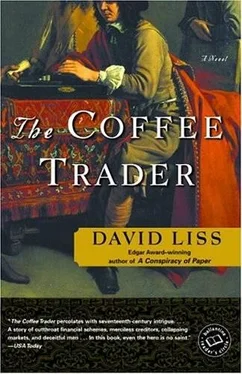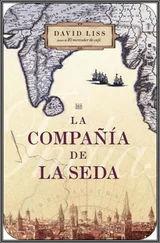Hendrick stared, as though he couldn’t understand Miguel’s good, if thickly accented, Dutch.
“Today is not the day,” Miguel said, a bit more forcefully. He avoided speaking too adamantly to Hendrick, whom he had once seen slam a butcher’s head into the stones of the Damplatz for selling Geertruid rancid bacon.
Hendrick gazed at Miguel with the special pity men of the middle rank reserved for their superiors. “Madam Damhuis told me to inform you that today is the day. She tells me that she will show you something, and when you set your eyes on it, you will forever after divide your life into the time before this afternoon and the time after .”
The thought of her disrobing flashed before him. That would be a lovely divide between the past and the future and would certainly be worth setting aside his business for the afternoon. However, Geertruid loved to play at these games. There was little chance she meant to take off as much as her cap. But there was no getting rid of Hendrick, and urgent as his troubles might be, Miguel could make no deals with this Dutchman lurking in his shadow. It had happened before. He would trail Miguel from tavern to tavern, from alley to canal side, until Miguel surrendered. Best to have this over with, he decided, so he sighed and said he would go.
With a sharp gesture of his neck, Hendrick led them off the ancient cobbled street and across the steep bridges toward the new part of the city, ringed by the three great canals-the Herengracht, the Keizersgracht, and the Prinsengracht-and then toward the Jordaan, the most rapidly growing part of town, where the air echoed with the ring of hammer on anvil and the chipping of chisel on stone.
Hendrick led him along the waters of the Rozengracht, where barges pierced the thick canal mist as they headed toward the docks to unload their goods. The new houses of the newly wealthy stood on either side of the murky water, facing the oak- and linden-lined waterway. Miguel had once rented the better part of so fine a house, red-brick and steeple-gabled. But then Brazilian production of sugar had far exceeded Miguel’s expectations. He’d been gambling on low production for years, but suddenly Brazilian farmers unleashed an unexpected crop, and in an instant prices collapsed. A great man of the Exchange as instantly became a debtor living off his brother’s scraps.
Once they departed from the main street, the Jordaan lost its charm. The neighborhood was new-where they stood had been farmland only thirty years before-but already the alleyways had taken on the decrepit cast of a slum. Dirt replaced the cobblestones. Huts made of thatch and scraps of wood leaned against squat houses black with tar. The alleys vibrated with the hollow clacking of looms, as weavers spun from sunup until late into the night, all in the hope of earning enough to keep their bellies full for one more day.
In moments of weakness, Miguel feared that poverty would claim him as it had claimed the wretched of the Jordaan, that he would fall into a well of debt so deep he would lose even the dream of recovering himself. Would he be the same man then-himself, yet penniless-or would he become as hollow as the beggars and luckless laborers he passed on the streets?
He assured himself it would not happen. A true merchant never gives in to gloom. A man who has lived as a Secret Jew always has one more trick to save his skin. At least until he fell into the clutches of the Inquisition, he reminded himself, and there was no Inquisition in Amsterdam. Just the Ma’amad.
But what was he doing here with this inscrutable Dutchman? Why had he allowed his will to collapse when he had business, important business, to pursue?
“To what sort of place are you taking me?” Miguel asked, hoping to find a reason to excuse himself.
“A miserable sort of place,” Hendrick said.
Miguel opened his mouth to voice an objection, but it was too late. They had arrived.
Though he was not, like the Dutch, inclined to believe in omens, Miguel would later recall that his venture had begun in a place called the Golden Calf, surely an unpromising name. They climbed down a steep and viciously low-ceilinged stairwell to the cellar, a little room that might comfortably have held thirty souls but now contained perhaps fifty. The choking smoke of cheap West Indian tobacco and musty peat stoves nearly suppressed the scent of spilled beer and wine, old cheese, and the odor of fifty unwashed men-or, rather, forty men and ten whores-whose mouths puffed out onions and beer.
At the bottom of the stairs, an enormous man, shaped remarkably liked a pear, blocked their passage, and sensing that someone wished to get by he moved his bulk backwards to prevent anyone from squeezing past. He held a tankard in one hand and a pipe in the other, and he shouted something incomprehensible to his companions.
“Move your monstrous bulk, fellow,” Hendrick said to him.
The man turned his head just enough to register his scowl and then looked away.
“Fellow”-Hendrick tried again-“you are the hard turd in the ass of my journey. Don’t make me apply a purgative to flush you out.”
“Go piss in your breeches,” he answered, and then belched laughter in his friends’ faces.
“Fellow,” said Hendrick, “turn around and see to whom you speak so rudely.”
The man did turn around, and as he saw Hendrick the grin melted from his jowly three-days-unshaved face. “Begging your pardon,” he said. He pulled his cap down off his head and moved quickly out of the way, knocking clumsily into his friends.
This newfound humility wasn’t enough to satisfy Hendrick, who reached out like the lash of a whip and grabbed the man’s filthy shirt. The tankard and pipe fell to the floor. “Tell me,” Hendrick said, “should I crush your throat or not crush your throat?”
“Not crush,” the drunk suggested eagerly. His hands flapped like bird wings.
“What do you say, Jew Man?” Hendrick asked Miguel. “Crush or not crush?”
“Oh, let him go,” Miguel answered wearily.
Hendrick released his grip. “The Jew Man says to let you go. You remember that, fellow, next time you think to toss a dead fish or rotten cabbage at a Jew. A Jew has saved your hide today, and for no good reason, too.” He turned to Miguel. “This way.”
A nod from Hendrick was enough, and the crowd gave way for them as the Red Sea parted for Moses. Across the tavern, Miguel saw Geertruid, sitting at the bar, pretty as a tulip in a dung heap. When Miguel stepped forward she turned to him and smiled, wide and bright and irresistible. He could not help but return the smile, feeling like a fool boy, which was how she regularly made him feel. She had an illicit charm about her. Spending time with Geertruid was like bedding a friend’s wife (something he had never done, for adultery is a most dreadful sin, and no woman he’d ever met had been tempting enough to lead him down that path) or giving a virgin her first kiss (which was something he had done, but only once, and that virgin later became his wife). The air around Geertruid always tingled with forbidden and elusive desire. Perhaps it was because Miguel had never spent so much time with a woman to whom he was unrelated without bedding her.
“Madam, I’m honored you wished to see me, but I’m afraid I haven’t time for these diversions just now.”
“Reckoning day approaches,” she said sympathetically. She shook her head with a sadness that bordered somewhere between maternal and mocking.
“It approaches, and I’ve a great deal to put in order.” He thought to tell her more, that things had gone badly and, unless he could devise a remarkable scheme, he would be another thousand in debt within a week. But he didn’t say that. After six months of brutal, relentless, numbing indebtedness, Miguel had learned a thing or two about how to live as a debtor. He had even considered writing a little tract on the matter. The first rules were that a man must never act like a debtor and he must never announce his troubles to anyone who did not need to know them.
Читать дальше












